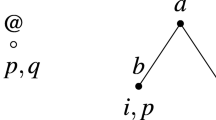Abstract
This paper brings together ideas from work on commonsense causal reasoning and work on formalising attitudes, such as beliefs, desires, intentions and obligations, to provide the basis of a theory of changing attitudes. It takes the view that rational agents do not change their attitudes without reason, and aims to represent such changes in teleological theories. The infrastructure of these theories contain persistence rules which state that agents attitudes persist unless they have reason to change them. Theories giving the agents' reasons for changing their attitudes build on these. This leads to a discussion of rationality in resource-bounded agents and the paper concludes by outlining an AI-planning theory of rational agency.
Preview
Unable to display preview. Download preview PDF.
Similar content being viewed by others
References
J. Ambros-Ingerson and S. Steel: Integrated Planning, Execution and Monitoring. Proceedings AAAI'88, pp. 83–88.
L. Aqvist: Deontic Logic. In: D. Gabbay and F. Guenthner (eds.): Handbook of Philosophical Logic, Vol. II. Dordrecht: D. Reidel 1984, pp. 605–714.
G.E.M. Anscombe: Intention (second edition). Oxford: Basil Blackwell 1963.
J. Bell: Why the frame problem is not a problem. AI Communications 3(1) pp. 3–10, (1990).
J. Bell: Extended causal theories. Artificial Intelligence 48 pp. 211–224, 1991.
J. Bell: Pragmatic Logics. Proceedings KR'91, pp. 50–60 (1991).
J. Bell: Model-based causal reasoning. In: P. Doherty and D. Driankov (eds.): Partiality, Modality and Nonmonotonicity; Proceedings of the Workshop on Partial Semantics and Nonmonotonic Reasoning, Linköping, Sweden, May 1992. Oxford: Oxford University Press, to appear.
J. Bell: Pragmatic reasoning, a model-based theory. In: M. Masuch and L. Polos (eds.): Applied Logic, How, What and Why; Proceedings of the Applied Logic Conference, Amsterdam, December 1992. Amsterdam: Kluwer Academic Publishers, to appear at the end of 1994, pp. 1–28.
M.E. Bratman: Intention, Plans, and Practical Reason. Cambridge Massachusetts: Harvard University Press 1988.
M.E. Bratman: Planning and the Stability of Intention. Minds and Machines 2, pp. 1–16 (1992).
F. Brown (ed.): The Frame Problem in Artificial Intelligence. San Mateo, California: Morgan Kaufmann 1987.
B. Chellas: Modal Logic. Cambridge: Cambridge University Press 1980.
P. Cohen and H. Levesque: Intention is choice with commitment. Artificial Intelligence 42 pp. 213–261 (1990).
R. Fagin and J. Halpern: Belief, awareness, and limited reasoning. Artificial Intelligence 34, pp. 39–76 (1988).
R. Fagin, J. Halpern, Y. Moses, and M. Vardi: Reasoning About Knowledge. Cambridge Massachusetts: MIT Press, to appear in 1995.
P. Gärfenfors: Knowledge in Flux. Cambridge Massachusetts: MIT Press 1988.
S. Graham: Further investigations in model-based causal reasoning. M. Sc. Project Report, Dept. of Computer Science, Queen Mary and Westfield College, London E1_4NS, 1993.
B. Grosz and S. Kraus: Collaborative plans for group activities. Proceedings IJCAI-93, Vol 1, pp. 367–373, (1993).
J. Halpern (ed.): Theoretical Aspects of Reasoning About Knowledge. San Mateo California: Morgan Kaufmann 1986.
W.H. Hanson: Semantics for deontic logic. Logique et Analyse 8 pp. 177–190 (1965).
D. Harel: First-Order Dynamic Logic. Berlin: Springer 1979.
J. Hintikka: Knowledge and Belief. New York: Cornell University Press 1962.
H. Kamp: Tense Logic and the Theory of Linear Order. Ph.D. dissertation, Department of Philosophy, UCLA, 1968.
J. Pollock: The phylogeny of rationality. Cognitive Science 17, pp. 563–588 (1993).
W.V.O. Quine: Two dogmas of Empiricism. In: From a Logical Point of View. Cambridge Massachusetts: Harvard University Press 1953.
A.S. Rao and M.P. Georgeff: Modelling rational agents within a BDI-architecture, Proceedings KR'91, pp. 473–484 (1991).
J. Searle: Minds, Brains, and Science. Cambridge Massachusetts: Harvard University Press 1984.
Y. Shoham: Reasoning About Change. Cambridge Massachusetts: MIT Press 1988.
Y. Shoham: Agent-oriented programming. Artificial Intelligence 60, pp. 51–92 (1993).
B. van Fraassen: Values and the heart's command. The Journal of Philosophy 70, pp. 5–19 (1973).
D. Wilkins: Practical Planning. San Mateo California: Morgan Kaufmann 1988.
Author information
Authors and Affiliations
Editor information
Rights and permissions
Copyright information
© 1995 Springer-Verlag Berlin Heidelberg
About this paper
Cite this paper
Bell, J. (1995). Changing attitudes. In: Wooldridge, M.J., Jennings, N.R. (eds) Intelligent Agents. ATAL 1994. Lecture Notes in Computer Science, vol 890. Springer, Berlin, Heidelberg. https://doi.org/10.1007/3-540-58855-8_2
Download citation
DOI: https://doi.org/10.1007/3-540-58855-8_2
Published:
Publisher Name: Springer, Berlin, Heidelberg
Print ISBN: 978-3-540-58855-9
Online ISBN: 978-3-540-49129-3
eBook Packages: Springer Book Archive




